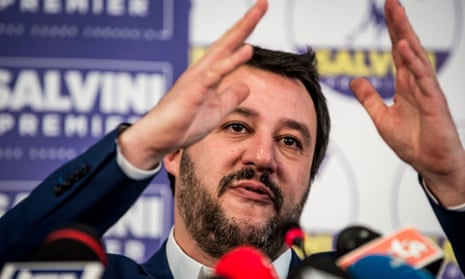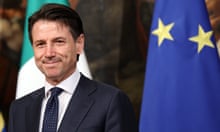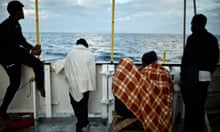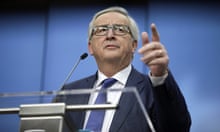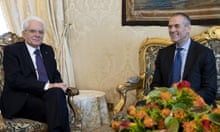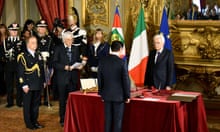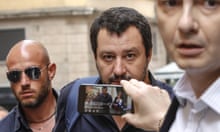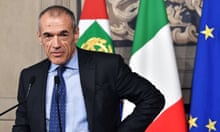The two populist parties that won major upsets in the Italian election – the Five Star Movement (M5S) and the League (La Lega) – are in a race to be the first to try to form a majority government after the election produced a hung parliament.
The decision will ultimately fall to Italy’s president, Sergio Mattarella, who could take weeks to determine whether the anti-establishment M5S, which took 32.6% of the vote, or a fragile centre-right alliance led by the League’s bombastic Matteo Salvini, with 35.7% of the vote, are better equipped to create a majority government.
As Italy and Europe digested the news on Monday that a majority of Italian voters had supported Eurosceptic candidates in the national election, both sides began jockeying for position, saying each had earned the right to lead. The Italian constitution gives Mattarella the power to give the mandate to any party, regardless of who has won the most votes.
“The centre-right is the coalition that won, it’s the coalition that can govern,” Salvini said in a press conference in Milan. Hours later, it was a sentiment echoed by 31-year-old Luigi Di Maio, the head of the M5S.
While the former prime minister Silvio Berlusconi had been seen as leading the centre-right coalition, results showed he was beaten by his younger rival on the right, following a campaign in which Salvini emphasised support for radical immigration policies, including mass deportations of immigrants who are in Italy illegally.
As ballots continued to be counted on Monday afternoon, it was clear that no single party or alliance would have enough votes to win a clear majority. What was evident is that the voters were not convinced by the pro-EU arguments put forward by the centre left, led by former prime minister Matteo Renzi.
The Democratic party won just 18.7% of the vote – a dismal showing – and Renzi, who was once seen as a bright promising politician, submitted his resignation in front of television cameras on Monday evening.
“I think we have clearly recognised that it is a clear defeat, a defeat that requires us to open a new page within the Democratic party,” he said.
Renzi also suggested that the party had already said “no” to any deal with parties he considered to be “extremists” and that he would retreat in favour of a simpler role: senator for his native Florence.
In rejecting Renzi and voting for Di Maio and Salvini, who have both flirted with calls for a referendum on the euro (which Italians would not support), the results nevertheless represented a repudiation of Brussels by Italian voters, less than two years after the UK narrowly voted to leave the European Union.

In Brussels, there was ill-concealed dismay – although the European commission was keen to insist the results were yet to be made official.
The commission’s chief spokesman, Margaritis Schinas, told reporters its president, Jean-Claude Juncker, wanted to see a “stable government in Italy” and “regarding the potential impact and so on and so forth... ‘Keep calm and carry on’”. Asked to respond to the claims by Salvini, that interventions by Juncker during the election campaign had given his party a boost, Schinas declined to comment.
He said: “We have confidence in President Mattarella … to facilitate the forming of a stable government in Italy.”
Two weeks ago, Juncker warned that the EU was expecting a bad outcome. “We have to brace ourselves for the worst scenario and the worst scenario could be no operational government,” he had said. He later backtracked to insist he was confident an operational government would be formed in the wake of the polls.
Quick GuideParties in the Italian election
Show
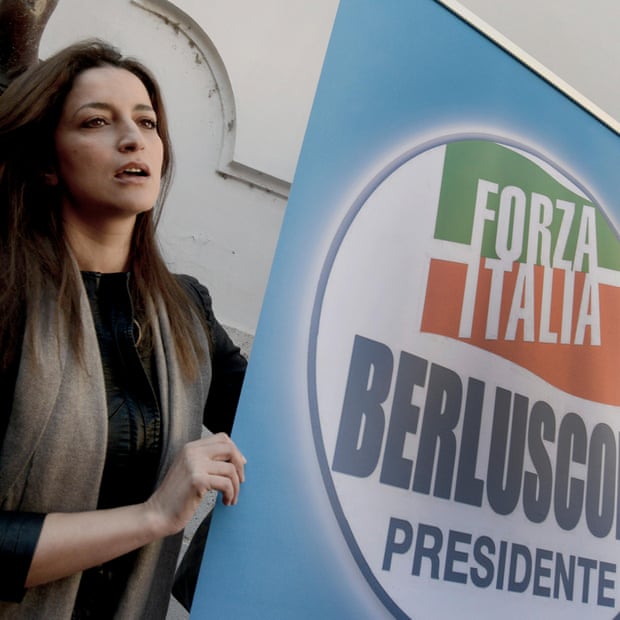
Forza Italia
Led by four-time prime minister Silvio Berlusconi (although he himself cannot stand owing to a tax fraud conviction). Wants to introduce a “parallel currency” for domestic use, keeping the euro for international trade. Other policies include: a single “flat rate” income tax for companies and individuals; abolishing housing, inheritance and road tax; doubling the minimum pension; introducing a minimum income of €1,000 a month for all; blocking new immigrant arrivals.
Northern League
Led by Matteo Salvini. Promises to introduce a parallel currency and a flat tax for all at 15%, as well as allowing earlier retirement, repatriating 100,000 illegal immigrants a year and reopening Italy’s brothels.
Brothers of Italy
Led by Giorgia Meloni. A southern equivalent of the Northern League with neo-fascist roots; policies broadly similar.
Five Star Movement
Led by Luigi Di Maio. Proposes a minimum monthly income of €780; raising the budget deficit; repealing 400 “useless” laws, including labour and pension reforms to allow earlier retirement and make firing harder; raising taxes on energy companies; improving relations with Russia.
Democratic party
Led by Matteo Renzi. Proposes an increase in minimum wage; negotiating to abolish the EU’s fiscal compact (which imposes stiff budget cuts on high-debt countries); raising the budget deficit to 3% of GDP so as to cut taxes and increase investment.
Free and Equal
Led by Piero Grasso. New party uniting smaller leftwing groups. Proposes to repeal labour and pension reforms and boost public spending.
The results were extraordinary in part because they reflected a rejection of what most analysts would agree has been a fairly competent government under the Democratic party, which has overseen a big improvement in the economy and adopted policies that limited the number of migrants coming to Europe, in favour of inexperienced political leaders with controversial views on issues ranging from their support of Vladimir Putin to scepticism about the efficacy of mandatory vaccinations.

The M5S’s poor handling of leading jobs in municipal governments in Rome and Turin did not appear to dissuade voters, even as the Democratic party sought to hammer home a message that a vote for the former would bring chaos.
The populist party had until recently endorsed a referendum on the euro, but toned down its anti-euro rhetoric in the run-up to the national election, which may have given some comfort to Italians, who do not significantly support leaving the eurozone, although they are critical of Brussels.
Analysts on Monday morning said it was far from clear how the parties might cobble together a majority.
Possibilities include a marriage of convenience between M5S and the Democratic party – over Renzi’s objections – or M5S and the League.
